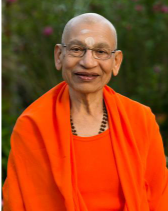
Spirituality

By Swami Viditātmānand Saraswati*
Kāma, the fundamental cause of all problems
A question arises from this statement that why do people not follow this opinion of Bhāgavata?
Why would they behave opposite to that? Even while knowing that in doing so, they are disobeying the command of Īśvara; why are they not fearful? What is the factor which is making these deluded people behave in this conflicting way?
Arjuna asks a question to know this:
अथ केन प्रयुक्तोऽयं पापं चरति पूरुषः ।
अनिच्छन्नपि वार्ष्णेय बलादिव नियोजितः ॥ ।।3.36।।
O, Kṛṣṇa, born in the vṛṣṇi lineage, who is as though appointing this person forcefully to commit a sin even when he does not wish to do so? What is that factor which is motivating a person to commit sins even when knowing what is right and what is wrong in life, what is considered following the dharma in certain situations and what is adharma?
The person that is referred to here is the one who has some discrimination, he knows the difference between puṇya and pāpa and even then, he is not able to practice puṇya. Bhagavān said that karma performed with an attitude of yoga or self-surrender frees one from bondage.
Sāstra teaches this attitude to us through the values such as non-violence, truth, non-stealing etc…We have knowledge of these values; however, we are unable to practice these values, and we end up losing the value of these values, what is the reason for that?
It is important to understand this because we see these values being sacrificed all around us and we also feel like joining the majority in sacrificing these values. However, we hate others and hate ourselves also when these values are not practised. There is no positive result of this hatred, but it is negative. Therefore, we should understand the reason for that type of behaviour in which the values are sacrificed. Here, Arjuna also says that while not having the desire, as though he is forcefully inspired to engage in that inappropriate behaviour, as though he is made helpless. In this context, this statement by Duryodhana is well-known: I know what dharma is, however, I am not able to put it into practice. I know what adharma is, however, I am not able to leave it. There is a deva in my heart and I behave in whichever way he inspires me.
In reality, it is not the deva residing in the heart but the dānava who inspires one to practice adharma. That means, there is helplessness behind the practice of adharma, not happiness.
Actually, Bhagavān has given humans the freedom to make decisions so that in every situation they can discriminate between what is appropriate and what is not and can only perform that action which is appropriate. When there is discrimination, one can evaluate the situation according to his saṁskāra and education and he is able to do what is appropriate in that situation according to his duty. However, many times it so happens that a veil comes over this power of discrimination.
Not only that, the intellect seems to get distorted and then it perceives wrong as right and right as wrong. What is the reason for this? This is the question of Arjuna.
It is not like Bhagavān has not discussed this topic till now. It was said in the second chapter: O Kaunteya (Arjuna), even after the person with discriminative power makes efforts, the powerful senses forcefully take the mind away onto the wrong path. (Bhagwad Gita 2-60)
And He also explained the reason for that: when one adamantly avoids enjoyment of objects, he can physically distance himself from the objects, however, the rāga (attachment) to the objects remains in his mind. Thus, it was said that rāga forcefully takes one on the wrong path. However, Arjuna wants to understand this subject thoroughly and so he asks Bhagavān.
Bhagavān responds:
काम एष क्रोध एष रजोगुणसमुद्भवः।
महाशनो महापाप्मा विद्ध्येनमिह वैरिणम्।।3.37।।
This is kāma (desire), this is krodha (anger). They arose from rajo guna (and they also create rajo guna). They are great voracious, great sinners. Know them as enemies in this śreya mārga.
O Arjuna, about which you want to know, what forces one to commit sins is this great enemy kāma only. And that only results in krodha. What is kāma now eventually takes the form of krodha.
In the second chapter, Bhagavān very nicely described the origination of kāma and krodha and the devastation caused by them: When one dwells upon sense objects, he develops attachment for them, and love for them. That love turns into desire and anger is born from desire. Delusion originates from anger and due to delusion, memory is lost. Because of the loss of memory, intellect is incapacitated/lost and because of the loss of the intellect, he is ruined/destroyed. (B.G. 2.62-63)
When interest to enjoy sensual pleasures has been left in the mind, dwelling upon those sensual objects creates attachment, and love for them. It is not a rule that pondering upon the sensual objects for sure creates attachment to them. If there is no rāga-dveṣa in mind, one can ponder upon those sensual objects without expectation or bias and can evaluate them appropriately and then can discriminatively decide how to transact with them. In such a decision, the current wisdom, saṁskāra, education etc. are useful. He could make a mistake in his decision; however, because he had taken that decision with understanding, the understanding can be modified and in this manner, he can learn something from this process. This is a process for internal development.
However, when the contemplation on an object, person or situation is done with rāga-dveṣa, that is not fair. If one contemplates upon a person with rāga, he would only see that person’s virtues, and faults will not even be noticed. Because of such biased criticism, either association or hatred arise. These are both reactions. This is called saṅga in the above verse. If this type of biased contemplation continues, this type of thought keeps getting accrued, then that association results in kāma or tṛṣṇā (craving). ‘I have to have this’, ‘I can not live without this’, and such decisions are called kāma. That kāma forces one to obtain that sensual object and enjoy it. By contemplation with hatred, decisions arise such as ‘I must avoid this’, ‘I cannot handle this if it exists’ and a desire to distance from an object or individual arises.
In this manner, by the contemplation of an object with rāga-dveṣa, a desire arises to obtain and enjoy that object or to destroy it. Any of these desires inspires one to perform karma. If that desire is satisfied, elation arises otherwise sadness or anger arises. Thus, as a result of desire, impulses of elation or sadness arise. If a desire is satisfied, then a desire to achieve more and enjoy more arises which is called greed. And if a desire is not satisfied, anger arises toward whatever is an obstacle in fulfilling that desire. So, desire results in anger or greed.
*Swami Viditatmananda Saraswati has been teaching Vedānta Prasthānatrayī and Prakaraṇagranthas for the last 40 years in Ahmedabad, Gujarat. Throughout the year, he conducts daily Vedānta discourses, accompanied by retreats, and Jñāna Yajñas on Vedānta in different cities in India and in foreign countries.





